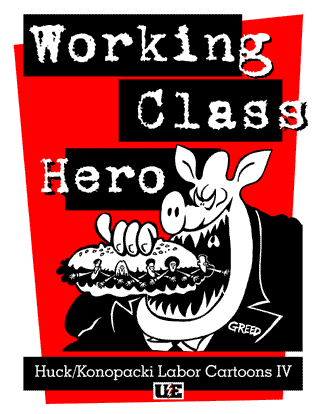
Stemming from the discussion of my last post, I thought further discussion was necessary to talk about the "working class"...or whatever that means anymore, and our efforts to get our society organized along revolutionary lines. I think it prudent to look in as many directions as possible for lessons, ideas, and theory. I recently found Murray Bookchin's short essays about the anarchosyndicalist revolution of 1936 instructive.
Please forgive the wholesale use of Bookchin to elucidate what I was trying to say in my last post, not too mention what I think John Holloway is also trying to say in Change the World Without Taking Power, but here you go:
The limitations of the trade union movement, even in its anarchosyndicalist form, have become manifestly clear. To see in trade unions (whether syndicalist or not) an inherent potentiality for revolutionary struggle is to assume that the interests of workers and capitalists, merely as classes, are intrinsically incompatible. This is demonstrably untrue if one is willing to acknowledge the obvious capacity of the system to remake or to literally create the worker in the image of a repressive industrial culture and rationality. From the family, through the school and religious institutions, the mass media, to the factory and finally trade union and "revolutionary" party, capitalist society conspires to foster obedience, hierarchy, the work ethic, and authoritarian discipline in the working class as a whole; indeed, in many of its "emancipatory" movements as well.
The factory and the class organizations that spring from it play the most compelling role in promoting a well-regulated, almost unconscious docility in mature workers--a docility that manifests itself not so much in characterless passivity as in a pragmatic commitment to hierarchical organizations and authoritarian leaders. Workers can be very militant and exhibit strong, even powerful character traits in the most demanding social situations; but these traits can be brought as much , if not more readily, to the service of a reformist labor bureaucracy as to a libertarian revolutionary movement. They must break with the hold of bourgeois culture on their sensibilities--specifically, with the hold of the factory, the locus of the workers' very class existence--before they can move into that supreme form of direct action called "revolution," and further, construct a society they will directly control in their workshops and communities.
This amounts to saying that workers must see themselves as human beings, not as class beings; as creative personalities, not as "proletarians"; as self-affirming individuals, not as "masses.' And the destiny of a liberated society must be the free commune, not the confederation of factories, however self-administered; for such a confederation takes a part of society--its economic component--and reifies it into the totality of society. Indeed, even that economic component must be humanized precisely by our bringing an "affinity of friendship" to the work process, by diminishing the role of onerous work in the lives of producers, indeed, by a total "transvaluation of values" (to use Nietzsche's phrase) as it applies to production and consumption as well as social and personal life.